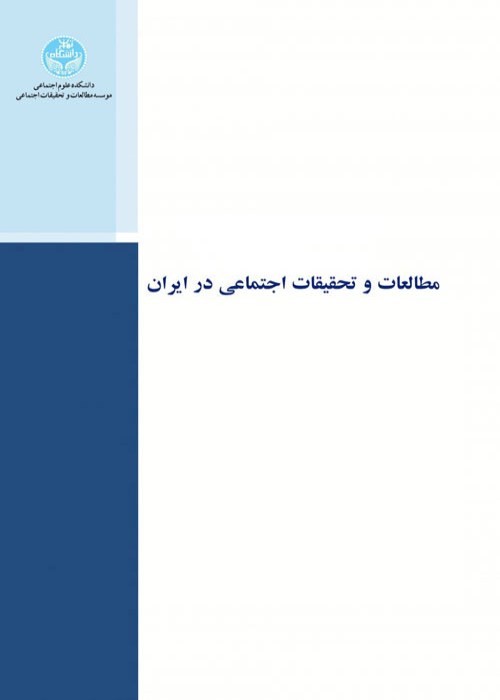An Empirical Model of the Constitutional Condition of Neighborhood Collective Action
Author(s):
Article Type:
Research/Original Article (دارای رتبه معتبر)
Abstract:
Introduction
In spite of diversity in definition, all forms of collective action have a common property: a group of people cooperating for a public good (Tomas, Louis, 2013). Because of the non-exclusive nature of public goods, the rational action is to free ride and don't contribute to the collective action. This is where the collective action problem arises. The collective action problems can vary according to the contextual state of where and when they are being studied. In this study, we tried to gain a better understanding of the mechanisms and conditions which lead to making collective action happen in Iran. There are some controversial judgements about collective action in Iran. This study aims to make a clearer idea about the issue, by conducting a field study research and analyze the neighborhood collective action as the analytical unit. Method
We used a multiple case studies method in our field survey of collective action. We used purposive sampling and theoretical sampling for finding our cases: “Ekbatan”, “Evin”, “Sharif residential complex” and “Rahahan residential complex”. Results and discussion
We suggest an empirical model of structures in two levels: The contextual conditions ("Social capital", "The neighborhood power structure" and "Initializer agent"), and the strategical conditions ("framing" and "mobilization"). This model represents different factors and concepts and the interactions among them, which make neighborhood collective action possible. The factors are derived from the field data of this study. Conclusion
The interaction among the factors of our model leads to a situation where collective action can happen. The concepts forming the contextual conditions of collective action are "Social capital", "The neighborhood power structure" and "Initializer agent" . It is the interaction among these concepts that trigger the public good as the goal of collective action. At the Strategy level, "framing" and "mobilization" are at work that have a bilateral effect on each other. Framing brings legitimacy for the mobilizations' mechanisms, and in return, the mobilization provides the resources needed for resonating the framing of collective action. The chance of having a successful collective action is also affected by the way structural concepts of the contextual conditions interact with the strategies that agents employ. Social capital makes the mobilization more accessible and create trust. The ability to effectively interact with the neighborhood power institutions, can bring legitimacy, make the mobilization process easier, and reduce the overall cost of collective action. The initializer agent forms the primary framing of the collective action and mobilize the primary forces and resources needed. The interaction among these factors with the mutual effects and the possibilities and restraints that they have on each other, make the collective action possible. Understanding these factors and their restraining and contributary effects on collective action is the first step for agents who want to make any changes via the collective action. This usage will only arise from the interaction of social agents' will and the structural constraints.Keywords:
Language:
Persian
Published:
Quarterly of Social Studies and Research in Iran, Volume:9 Issue: 4, 2020
Pages:
799 to 826
magiran.com/p2209767
دانلود و مطالعه متن این مقاله با یکی از روشهای زیر امکان پذیر است:
اشتراک شخصی
با عضویت و پرداخت آنلاین حق اشتراک یکساله به مبلغ 1,390,000ريال میتوانید 70 عنوان مطلب دانلود کنید!
اشتراک سازمانی
به کتابخانه دانشگاه یا محل کار خود پیشنهاد کنید تا اشتراک سازمانی این پایگاه را برای دسترسی نامحدود همه کاربران به متن مطالب تهیه نمایند!
توجه!
- حق عضویت دریافتی صرف حمایت از نشریات عضو و نگهداری، تکمیل و توسعه مگیران میشود.
- پرداخت حق اشتراک و دانلود مقالات اجازه بازنشر آن در سایر رسانههای چاپی و دیجیتال را به کاربر نمیدهد.
In order to view content subscription is required
Personal subscription
Subscribe magiran.com for 70 € euros via PayPal and download 70 articles during a year.
Organization subscription
Please contact us to subscribe your university or library for unlimited access!




